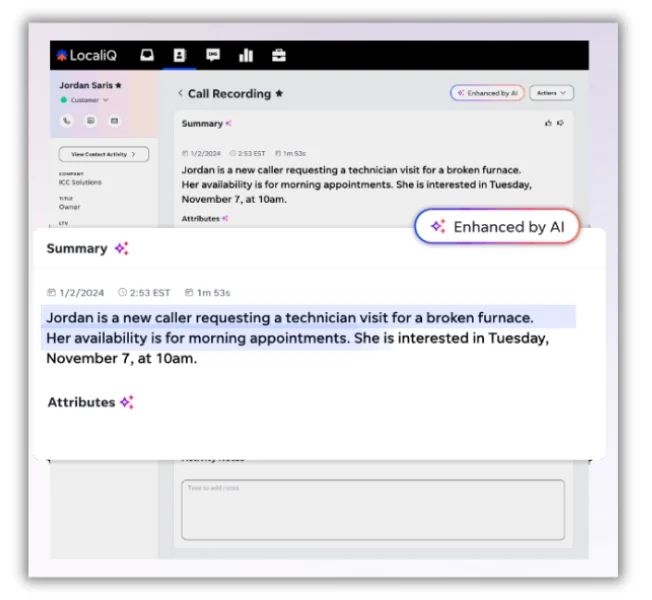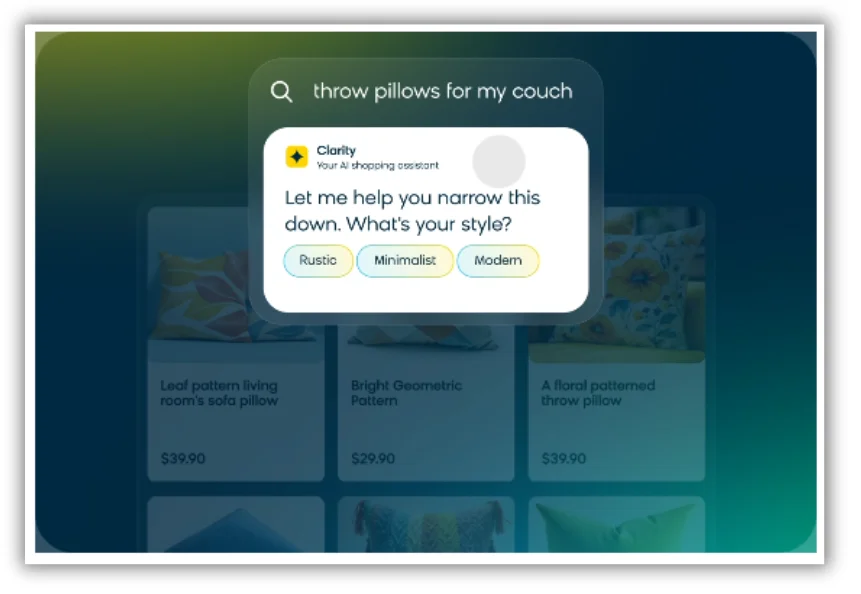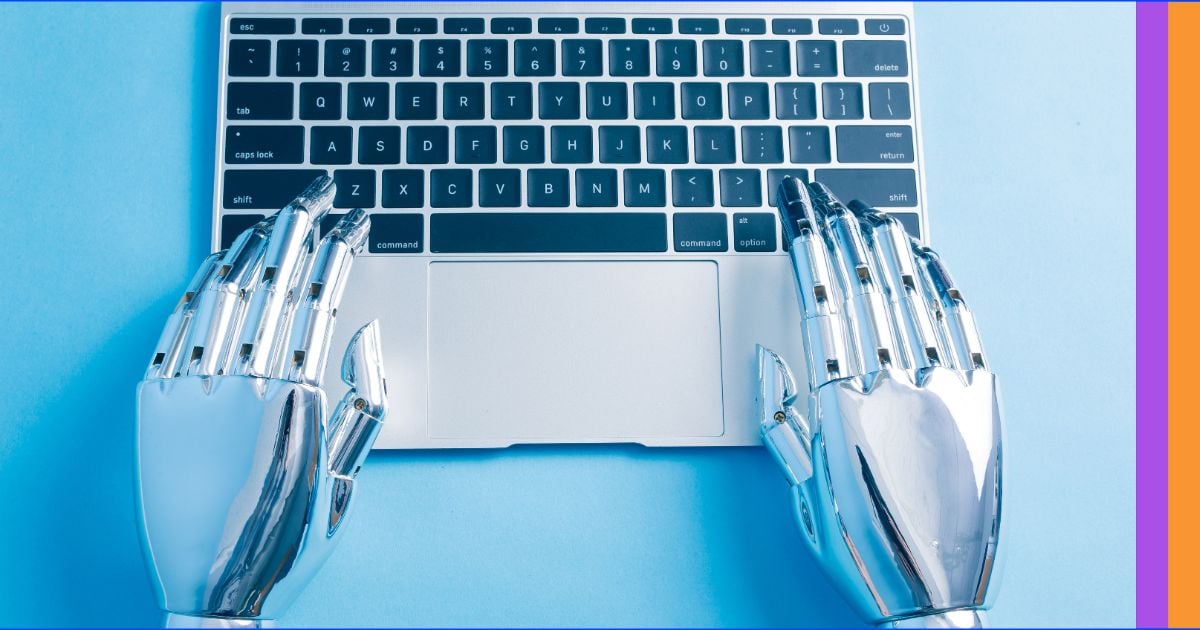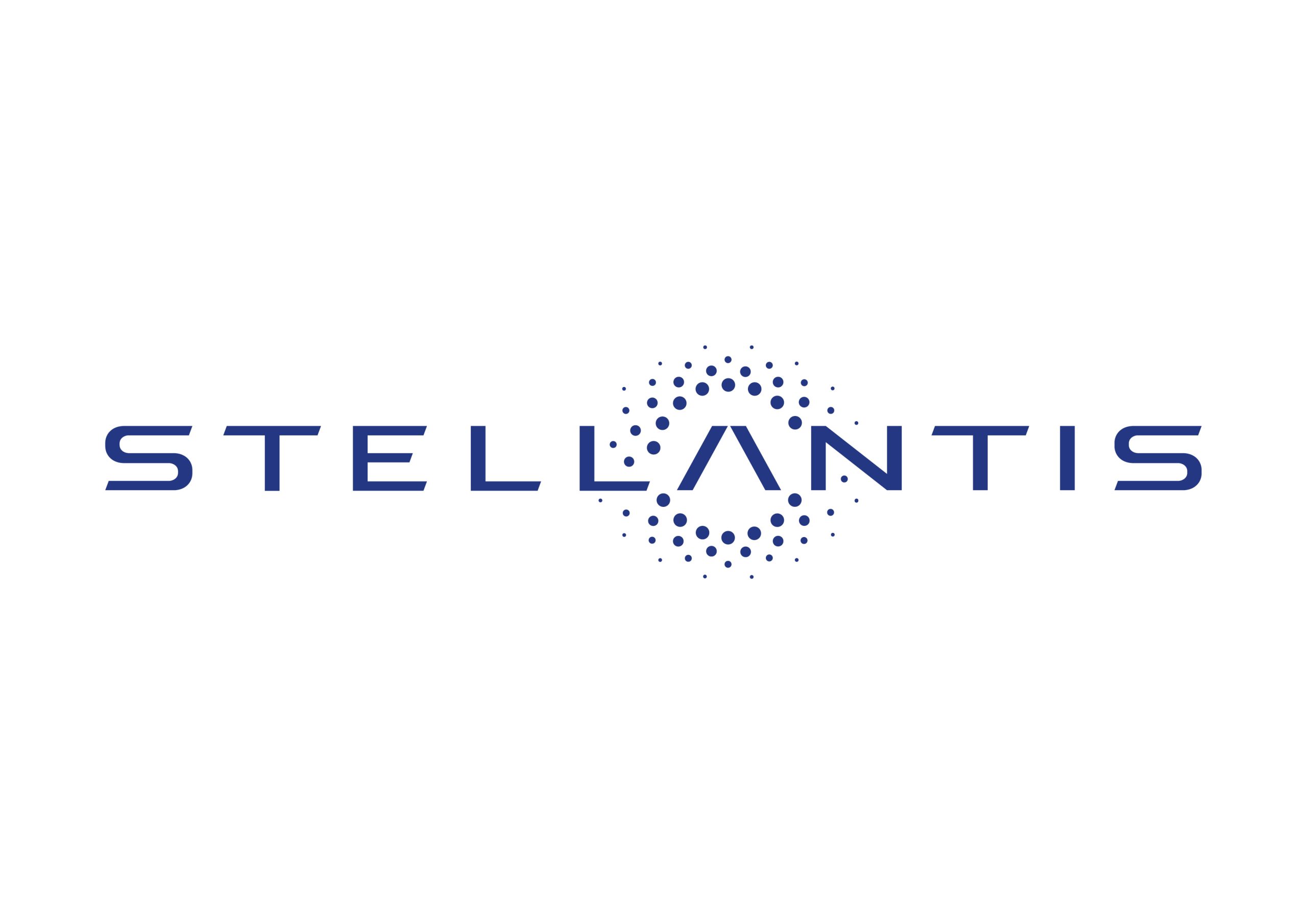Doing more with less seems to be a constant theme for business owners and marketers. That used to mean working more hours and finding hacky shortcuts to save time.
But now there’s a new breed of software called AI agents that promises to generate more results and save you time in the process. They’re already doing things like answering customer questions, managing new leads, and filling stock rooms more efficiently.
We’re here to explain how AI agents work in the real world and show you how to use them to grow your business.
Contents
What is an AI agent?
AI agents are tools that use artificial intelligence to answer questions and solve problems with little or no human intervention. They can understand changing contexts and make decisions on their own to achieve a goal.
You may be familiar with simple AI chatbots. AI agents can work similarly but with one distinct difference that sets them apart. An AI agent doesn’t just reply to a query. It can learn from each interaction to improve its performance. As you’ll see, that ability to adapt lets them take on very complex tasks.

LocaliQ’s AI agent helps business owners market to, manage, and respond to leads.
🚀 How else can AI help your business? Get the Emergency Guide to AI in Marketing and find out.
How do AI agents work?
There are hundreds of unique AI agents, and each works a little differently. But at the most basic level, they follow four similar procedures.
Setting goals
AI agents are designed to achieve specific goals like scheduling appointments, optimizing social media content, or managing the environmental controls of an office building. The first thing an agent will do is determine a goal.
Goals can be provided by a user, or an AI agent can set its own goals that lead to a larger objective.
Collecting and understanding data
AI agents make decisions and provide an output based on the data they receive. Often, that means starting with an initial training data set (like a year’s worth of customer service tickets). Then, the agent will continually collect more information through new interactions.
Data can come from any number of sources. Some agents review social media posts, news reports, customer transaction histories, and so on. The more recent and robust the data set, the better output you’ll get from an AI agent.
Making decisions and predicting outcomes
Here’s where the magic starts to happen. AI agents use algorithms and machine learning to make decisions and predictions based on all that data.
For example, if your pizza restaurant used an autonomous delivery robot, it could:
- Evaluate all the possible delivery routes available.
- Learn from each delivery to reduce time and risk.
- Adjust its actions based on past experience and current information (like maneuvering around a construction site or pausing for pedestrians).
- Predict potential outcomes like if it takes longer to deliver a pizza on three consecutive Monday evenings, it will predict a delay on future Monday evenings.


Pizza delivery robots are powered by AI agents that have to make lots of decisions on the fly.
Learning autonomously
AI agents learn autonomously (without direct human intervention) and improve their performance after each interaction.
Here’s an example. Say you launch a customer service AI agent on your ecommerce website. You’ve given it the goal of resolving customer inquiries satisfactorily and fed it some scripted responses to common questions.
At first, the agent provides generic responses. After the initial interactions, it tracks customer satisfaction scores, resolution rates, and message sentiment. The agent identifies which responses led to the best results and refines its language and problem-solving approaches.
What are the benefits of using AI agents for your business?
AI agents can reason and self-check, making them capable of taking on more complex tasks at a scale humans can’t. Here are a few of the biggest benefits you can get from these capabilities.
Save time and increase efficiency
With an AI agent, you can automate repetitive tasks and free up time for high-level work like creating strategies or improving your products and services.
Imagine if you tasked an AI agent with keeping track of your incoming leads. It could summarize phone call transcripts, categorize leads by things like the service they want or location, and automatically create follow-up reminders for high-priority leads. That’s hours of organizational work off your plate.


AI agents can learn about your business and reply to customers instantly, improving their experience.
Improve accuracy and consistency
Customers crave consistency. They want to get a reliable answer whenever they need it. AI agents can provide that level of consistency in a few ways. First, they can pull from a vast amount of data and process new data faster than humans without the fear of manual data entry mistakes.
Second, AI agents can standardize and repeat a process identically every time. They remove some of the human variability from the equation.
And third, an AI agent can track results in real time and flag inconsistencies quickly. They can even adjust workflows to reduce the chance of those inconsistencies happening again.
They can do all this while operating 24/7 so your customers get better answers without waiting until your business opens.
Give a competitive advantage
AI agents can collect and react to vast amounts of real-time data. How does that make you more competitive?
Think about customer segmentation and marketing personalization. What if each of your leads and customers received a highly personalized email with offers based on their behavior, spending habits, and demographics? And you didn’t have to lift a finger to make it happen?


AI agents can automatically segment your email audience and send personalized messages at just the right time.
That’s an example of how AI agents can make your business more competitive.
📫 Get everything you need for great emails >> The Complete Email Marketing Toolkit: Free Email Templates, Subject Lines & Tips
What are the five types of AI agents?
There are five commonly recognized types of AI agents in operation, although one agent can include several of these types. They’re each suited for different purposes.
Simple reflex AI agents
As the name suggested, simple reflex agents are the most basic of the AI agent bunch. They operate on a simple “if-this-then-that” decision-making architecture.
A smart thermostat that adjusts the environment in your shop is a good example of a reflex agent. It senses that the room temperature has dropped and starts the heater in response.
Model-based AI agents
Model-based AI agents are more complex. They not only respond to immediate inputs, but they also create a model of their environments and track changes as they happen. This additional capability allows model agents to predict potential outcomes before taking action.
Think about that pizza delivery robot as a model-based agent. It doesn’t just react to immediate inputs like a “don’t walk” sign. It remembers road rules, tracks how pedestrians act, and builds models from them—all of which help it decide the best route to deliver fresh, hot pizza.
Goal-based AI agents
Goal-based AI agents are often even more advanced. They have the capability to consider existing conditions and multiple potential future conditions to decide which action will achieve a goal. Goal-based agents use reasoning to adapt to a new strategy if one is not working.
A digital marketing agency could use a goal-based agent to assess and prioritize potential client leads. The AI agent would:
- Review website inquiries.
- Score them based on need fit and potential to close.
- Send an initial communication to each lead.
- Assign each lead based on their urgency and score.


Source
Utility-based AI agents
Utility-based AI agents are designed to handle situations with multiple competing outcomes. They assign a numerical score to each outcome and choose actions that maximize the overall benefit or reduce the overall harm.
An inventory management system for a small business is an example of a utility-based AI agent. It has three competing goals:
- Prevent stock outages
- Maintain a high stock turnover
- Reduce the overall cost of goods
The agent would learn from sales patterns and monitor changing vendor prices to buy each product at the optimal time and quantity to balance these objectives.
Learning-based AI agents
A learning-based AI agent is built to improve its performance through experience. It will change its decision-making strategy and develop more sophisticated problem-solving skills through experience.
Netflix’s recommendation engine is a great example of a learning-based AI agent. It tracks what you watch and learns your viewing patterns to progressively refine its suggestions.


Netflix’s recommendation engine is a learning-based AI agent.
5 examples of how businesses use AI agents
It’s hard to believe, but there are already hundreds (thousands?) of AI agents working to help businesses become more efficient, profitable, and beneficial to their customers. Here are five real-world examples of how they’re doing it.
Lead capture and management
Service businesses (roofers, physical therapists, etc.) know the challenge of balancing the need to provide a great experience for current customers with responding quickly and appropriately to new prospects.
AI agents, like the one through Dash by LocaliQ, are stepping in to help manage incoming leads. Dash can provide an AI summary of lead phone calls, automatically categorize each lead for easy reference, and prioritize incoming leads so users know which to contact first.


Dash helps businesses keep new leads organized and respond to them faster.
These AI agents can also send automatic responses to leads and even handle their initial inquiries. Service providers can focus on delighting their customers while giving faster attention to prospects.
Customer support
AI chatbots have been around for a while. But these tools have evolved beyond the simple “ask a question, get a canned response” version. Now, there are full-fledged AI agents being used to understand the context of customer questions and provide more complex answers.
Forethought is a good example of an AI agent focused on providing great customer service. When a user asks a Foresight agent a question, it pulls several insights from the intent and tone of the query to take an appropriate action.


Source
Customer service AI agents can make the tedious task of searching for answers on your website a breeze. And since agents learn as they go, each interaction will get better.
Social media scheduling
Social media marketing requires a lot of repetitive work and generates a lot of valuable data. That makes it a perfect application for an AI agent.
Agents in the social media scheduling space can automatically schedule posts at the optimal time, generate automatic replies to comments, review the trends and sentiments behind brand mentions, and much more. Sprout Social is a popular social media marketing management platform with built-in AI agents.


Source
Writing great posts is another essential part of social media marketing, and plenty of copywriting AI agents can help with that task, too.
🚀 Want to learn how AI can supercharge your ads strategy? Free guide >> 9 Powerful Ways to Use AI in Google & Facebook Ads
Conversational ecommerce shopping
Old-school chatbots (that sounds weird) could tell you the price or availability of a product in a chatbot window. Conversational shopping AI agents can jump in at any point during your shopping journey to help you find the perfect product…even if you’re not sure what it is.
Bloomreach offers just such an AI agent for conversational shopping. Its agent learns about individual shoppers and reacts to their needs on a website, in email, and through SMS texts (when the shopper approves).


Source
You can think of this type of AI agent as a store clerk who helps narrow down your choices, finds alternatives, and shares upcoming promotions. Only this clerk is ready to help during those midnight retail therapy sessions.
Human resources
If you’ve ever had to recruit and train new employees, you know how much work is involved. HR AI agents can screen new prospects, answer common employee questions, and walk new team members through the new hire orienteering process.
That’s what HiredScore AI by Workday does. It’s an AI agent that supports recruiters and hiring managers. It even acts like a hiring coach by helping to prioritize the best candidates and seeking out prospects from pools of previous applicants or current employees.


Source
HR is an ideal use case for AI agents because it requires lots of repetitive paperwork and processes. Plus, AI agents are great at performing tasks without human error or variation, which makes the hiring and onboarding process more consistent for every applicant.
4 tips for finding and using AI agents
We’ve reviewed lots of ways AI agents help businesses and shared several examples. The next step is to find the best AI agents for your business and get the most out of them.
Consider your needs
Step one is to review where you need help managing or marketing your business. Ask questions like:
- Where do I spend time on repetitive processes?
- How could an AI agent improve my customer’s experience?
- What skillset do I not have access to?
- Where does my business lose money?
With that list in hand, begin searching for AI agents that help solve those challenges.
Use free trials
Many AI agent plans include either a free tier or a free trial. Even if they don’t, you could always ask the sales team if you can try their product for a month.
Make sure you’re ready to put some time into the trial. You don’t want to use up three weeks of a 30-day trial before getting into the platform.
It’s also a good idea to go in with a list of goals and experiments. For example, if you’re trialing an accounting AI agent, you may want to know if it can accept payments from all the ways your customers pay.
Include human intervention
AI agents have come a long way, but they’re not flawless. Once your tool is up and running, decide how and when you’ll have a human review it. Test it out like your customers would review the output, and make sure it’s still on track.
Create an AI use policy
Hopefully, your employees will embrace the AI agents you bring into your business. You want to make sure they’re using it correctly and responsibly—and that they’re not using unapproved AI agents that aren’t trained in your data.
That’s why you’ll want to create an AI use policy upfront. You can keep it simple to start and add to it as new situations arise.
Set goals and measure progress
Don’t forget you invested in an AI agent for a specific objective. Is it achieving it?
The best way to know is to go into the process with a specific goal, like reducing customer support response time by 20%. Then, measure how you’ve progressed against that goal.
Is your business ready for AI agents?
AI agents can seem a little science fiction-y. But they’re not futuristic; they’re here now and can make your business more efficient and profitable.
Take a minute and think about where you would add an employee if money was no restraint, and look to see if an AI agent exists to handle that work. If not, wait about six months and check again. At the rate we’re progressing, there’ll likely be one soon. And if you’re ready to close more leads faster, contact us.











